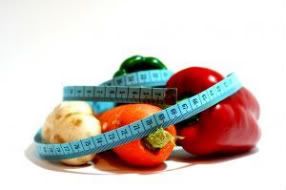Laxatives: The idea behind abusing laxatives is similar to purging, wanting to rid your body of excess calories as speedily as possible. But 100% of ingested calories are absorbed this way. All they
do is disrupt the normal functioning of your digestive system, cause electrolyte imbalance and make you dehydrated.
Diet Pills: At my most desperate hour, I tried Zantrex-3. I then turned into the most horrible witch in the world. My hunger level was unchanged.
Whether or not they lead to weight loss, they do
cause the following: nervousness, restlessness, insomnia, high blood pressure, fatigue and hyperactivity, heart arrhythmias and palpitations, congestive heart failure or heart attack, stroke, headaches, dry mouth, vomitting and diarrhea or constipation, intestinal disturbances, tightness in chest, tingling in extremities, excessive persperation, dizziness, disruption in mentrual cycle, change in sex drive, hair loss, blurred vision, fever and urinary tract problems. Overdoses can cause tremors, confusion, hallucinations, shallow breathing, renal failure, heart attack and convulsions.
If it still seems worth it, ponder the question "What happens when I stop taking them?"
Secretive Eating: This was a big one for me. In middle and high school, girls would be barely picking at their lunch, and I felt like if I ate mine, I looked like a "pig". Later, when I started to gain weight, I felt like they were looking at me and thinking, "see, that's why."It was a ridiculously self-absorbed view, and it contributed to my binge-eating, because by the time I allowed myself to eat, it had been hours. In college, you are going to have to eat in public. You will be gone a lot during the day, and if you wait until night to eat, you will be tempted to eat too much. Not eating isn't going to make anyone think that you just don't eat at all any more than eating is going to make them think you're a pig. Really, they're probably not thinking anything at all. Prepare healthy snacks like mixed nuts and trail mix and bring it with you to eat between class. Your friends are more likely to wish they had thought of that then think anything negative.
Over-Exercising: Yeah, I've done this one too. Again, it just makes you more hungry. If you feel like you've over-indulged, going for a walk is definitely helpful, but going and exercising for 5 hours usually just made me feel like eating again. If you are able to keep from eating more, you will be tempted to at your next meal. It has been more beneficial, to me, to either 1)work out 10 or 15 minutes extra on each work-out for the next week or 2)eat extra healthy the next day.
Letting Weight Affect Your Happiness: This one is tied up in all the others, isn't it? You're not happy about how much you ate, and then you think you'll feel better if you exercise it off.... alll of it off. You let how many calories you consumed in a day affect your mood and your relationships with others.
I admit I still have to work on this one. I have made some progress though. It helped when my therapist recommended I draw a pie chart of the important things in my life, and weight was right up there with family and friends. That's a real eye-opener.
When I am tempted to let my mood be affected by my body image, I remind myself of this: when happiness depends on human error, it means I will never truly be happy. I will always make at least one little "mistake." And then, I draw an imaginary line in my head representing a new beginning, and try to let the past stay there.
Not Listening to Your Body: Disordered eating can be summed up as this. It is when, for the sake of physical appearance and societal expectations, you purposely hurt your body. It is when you start letting the clock, calories, scale or size dictate when and what you eat, rather than health, energy, hunger and taste. It is when you have been feeling so bad about yourself, for so long, that the harmful side effects these practices have on your body start sounding worth it. if you would not feel comfortable talking to others about something you're doing as part of a "diet," then it's because you know they would be worried about you. And if they would be worried about you, shouldn't you be?
Listen to your body. It doesn't want to be fat or skinny. Your body wants to have a little extra padding, just in case you need it later. It wants to be lean enough to climb, but curvy enough to carry a child. If you eat according to its signals, and eat what makes it feel good, (not in the form of a temporary sugar high either, but strong and capable), then your health will be displayed in your appearance.









